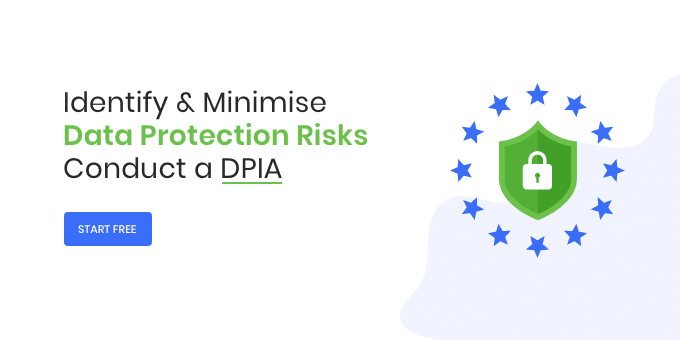Article 35 & 36 Of GDPR States:
A Data Protection Impact Assessment (DPIA) must be carried out whenever you start a new project, and it contains “a high risk” to people’s personal information.
The General Data Protection Regulation (GDPR) carries a plethora of rules that businesses must follow for the protection of personal data they collect on their clients.
Compliance with GDPR is important; otherwise, there are penalties for failure to comply. Penalties can approximately go up to $20 million or 4 percent of annual revenue (whichever is higher). There are countless companies that have received these severe fines.
Here’s How A DPIA Can Help Your Business Troubleshoot Privacy Issues:
In a nutshell, in a business setting, privacy considerations are overlooked because of greater attention towards profit centres of the business rather than its legal, social and ethical obligations. However, when we take into account the loss, fines and the public relations debacle a business can face when privacy is not handled well, then it all becomes a quantifiable mess.
Data protection seems expensive. But there is a way to change your data privacy stance and status without heavy costs. In order to deal with the quantifiable mess, Seers has developed its DPIA.
This Data Protection Impact Assessment (DPIA) allows a business to assess and monitor any potential threat areas and vulnerabilities.
Who Needs A Data Protection Impact Assessment?
Any business undergoing ownership, product, or an industrial change requires a DPIA. Conducting one can help it reduce its potential loss stemming from data privacy and protection issues. Hence, this tool can take care of such threats to the security and profitability of your business.
How Does A Data Protection Impact Assessment Work?
The DPIA works by investigating potential vulnerabilities. It can help with devising the way forward to improve the data privacy and compliance status. Thus, in return it can prevent potential losses, fines and negative publicity for a business. It works on several levels of compliance before a business begins its data processing activities. This is essential to maintain the security and integrity.
Data Protection Impact Assessment Under The GDPR
GDPR’s Article 35 and 36 covers Data Protection Impact Assessments. The DPIA is a new requirement under the GDPR as part of the “protection by design” principle.
The Law States:
“Where a type of processing, in particular, using new technologies and taking into account the nature, scope, context and purposes of the processing, is likely to result in a high risk to the rights and freedoms of natural persons, the controller shall, prior to the processing, carry out an assessment of the impact of the envisaged processing operations on the protection of personal data.”
The above passage states a DPIA under specific conditions. Down below are some examples of the types of conditions in which a company requires a DPIA.
- Whenever you use new technologies.
- If you track people’s behavior.
- When systematically monitoring a publicly accessible place on a large scale.
- If you’re processing personal data related to “racial or ethnic origin, political opinions, religious or philosophical beliefs, or trade union membership, and the processing of genetic data, biometric data for the purpose of uniquely identifying a natural person, data concerning health or data concerning a natural person’s sex life or legitimate interest sexual orientation”.
- If your data processing about people can cause legalities
- When you process children’s data.
- If your data processing can physically harm the data subjects if it is leaked.

“In case, there are no high-risk activities found; still, you should conduct a DPIA to reduce your liabilities. Moreover, you will be able to demonstrate and ensure that you are conducting best practice for data security and privacy within your organisation that will help build trust amongst your employees, customers and vendors.”
Conducting A Data Protection Impact Assessment:
In accordance with the GDPR’s Article 35, a DPIA must have all the elements mentioned below:
- A systematic description of the expected processing operations and their purposes, including where applicable and by the controller.
- An evaluation to check the necessity and proportionality of the processing operations in relation to the purposes.
- An assessment of the risks associated with the rights and freedoms of data subjects.
- The measures to address the risks, incorporating safeguards, security measures and mechanisms to assure personal data protection and to demonstrate compliance with the GDPR, taking into account the rights and legitimate interests of data subjects and other persons concerned.
Requirements
Data Protection Impact Assessments are carried out prior to highly risky projects. It is ideal to conduct your DPIA before and during the planning stages of your company’s new project.
Consultation is imperative, so you must either consult with a Data Protection Officer (DPO), the data controller or any other key stakeholders participating in your project.
The UK’s Information Commissioner’s Office (ICO) created a template for Data Protection Impact Assessments.
This template can help to guide you in the process of demonstrating that either, your data processing activities require a DPIA or not.
Frequently Asked Questions (FAQs)
1. What should a DPIA contain?
A Data Protection Impact Assessment should describe; the nature, scope, context and purposes of the processing. It must also evaluate necessity, proportionality and compliance measures and identify risks.
2· When should you complete a DPIA?
GDPR’s Article 35 highlighted several situations in which a DPIA is crucial. Especially, when you are processing large scale of special categories of data, or any personal data processing which relates to criminal convictions.
3. Do I need a Data Protection Impact Assessment?
Yes you need it if you face any high risks or data of individuals.
4. What are the seven principles of data protection?
There are seven key principles under GDPR:
- Lawfulness, fairness and transparency.
- Purpose limitation.
- Data minimization.
- Accuracy.
- Storage limitation.
- Integrity and confidentiality (security)
- Accountability.

